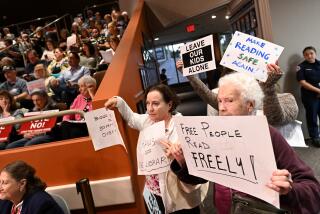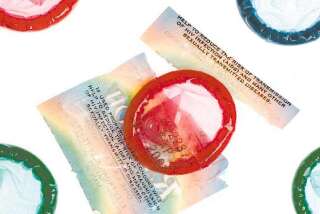No on Measure B
Performers in adult films risk their health and their very lives to do their controversial work. Despite advances in the treatment of HIV, there is not yet a cure for the virus, which causes AIDS. New, more virulent and in some cases reportedly untreatable strains of once manageable sexually transmitted diseases continue to appear: syphilis, gonorrhea, chlamydia. So it stands to reason that government would consider common-sense regulations to protect performers in the workplace. Just as regulations require helmets on construction sites to protect against debilitating head injuries, government could mandate that performers whose work requires sexual contact wear condoms.
The Times supported just such an ordinance in the city of Los Angeles last year in the name of protecting adult film performers. Now the AIDS Healthcare Foundation is back with a similar proposal that would apply countywide. If adopted by voters, the Safer Sex in the Adult Film Industry Act would require producers of adult films to obtain health permits and would require the use of condoms in acts of vaginal or anal intercourse in such productions.
It is on the ballot as Measure B, and in preparing to make a recommendation, The Times’ editorial page studied the city’s experiment and interviewed public health and legal experts and performers, producers and others in adult entertainment. Two conclusions became inescapable: Performers should protect themselves and others by wearing condoms, and should have the full support of producers and others in their business; and laws are unlikely to force them to do it. Given the nature of adult films, viewers will continue to demand, and producers will continue to present, films depicting explicit unprotected sex.
ENDORSEMENTS: The Times’ recommendations for Nov. 6
Measure B is well intentioned, but it is likely to stymie county government and bring little benefit to performers. The Times recommends a no vote.
It’s a close call. Not every argument put forward by either the AIDS Healthcare Foundation or the pornography industry can be accepted at face value. Producers and performers argue, for example, that the ordinance is unnecessary because they have mastered the problem of sexually transmitted disease in the industry with a rigorous program of testing. They say that the stable of adult performers is not much bigger than a typical high school graduating class, that they all know one another and are accountable to one another and that few, if any, “date” outside their industry.
Yes, major producers test, and top performers simply won’t shoot scenes with untested partners. Testing helps. But there is lag time between the time of the test and the next film, and performers could easily be infected during that period. Besides, not every pornographic film is produced by a major company, and not every performer is a much-sought-after top performer. There are more marginal companies that won’t behave responsibly, and there are vulnerable young performers just trying to get by who might not be able to say no when pressed to have on-screen sex with an untested partner.
But even if those performers would benefit from further protection, they’re unlikely to get it from Measure B. Some larger, more established companies would probably obey the new rules, but others would undoubtedly ignore them. Off-the-books shoots would continue, with producers naming their companies, hiring crew and performers, erecting sets, concluding filming and reorganizing for the next shoot under a new name long before county health officials learn of a production that needs a permit or a set that needs inspection. If government already can’t keep track of these productions, it is hard to imagine how it would enforce a permit and condom requirement. Under-the-radar productions would remain under the radar instead of being incorporated into the testing regimen of more established production companies, while those bigger companies — if their executives are to be believed — would be more likely to flee to unregulated counties, states and nations.
And if they flee — should we care? Porn is, after all, porn, and even though it has become more accepted in mainstream culture in recent decades and is occasionally considered hip where it was once widely dismissed as smut, it will never be universally embraced. No icons for pornography will ever be incorporated into the county seal alongside the Hollywood Bowl and the Spanish galleon.
Yet we should care, not necessarily because porn should be embraced but rather because it is an integral part of the entertainment industry that represents many jobs and a large part of the Southern California economy. Even if there are only a few hundred on-camera performers, porn is estimated to be a $1-billion to $2-billion industry, employing thousands of sound, lighting, stage, technical and other crew members and post-production workers in between gigs in more-mainstream film and television productions.
Even so, the economic argument alone would be insufficient to counterbalance the health threat to performers. Just as it may be cheaper for construction companies to let employees do their work without helmets, the potential loss of money or jobs cannot by itself outweigh the value of the lives of performers, their loved ones and others who could become victims of infection spread in adult productions.
But in a balancing test in which voters consider the effectiveness of testing (spotty but better than nothing), the costs and challenges of enforcement, and the continuing danger to performers who will either continue to work unprotected in unreported L.A. productions or follow the big companies to less regulated counties and states, the economic loss is a relevant factor.
If Los Angeles County could demonstrate that it was ready, willing and able to enforce a permit and condom requirement or that producers would not simply evade the requirement by leaving the county (and if audiences would choose to watch explicit sex scenes depicting condoms), Measure B could merit support. Instead, it’s impossible to predict the results of passage. Measure B then falls into the category of “Let’s pass it and see what happens.” That’s a bad way to make law because it puts government, or voters, on a track toward regulating all kinds of conduct without any hope of enforcing the requirements fairly and equally, and that in turn undermines the power of government.
Performers should use condoms. Producers should encourage them to do so. But the power of law to make them do it is limited. So is the desirability of always turning to government and lawmaking to address all dangers.
More to Read
A cure for the common opinion
Get thought-provoking perspectives with our weekly newsletter.
You may occasionally receive promotional content from the Los Angeles Times.






